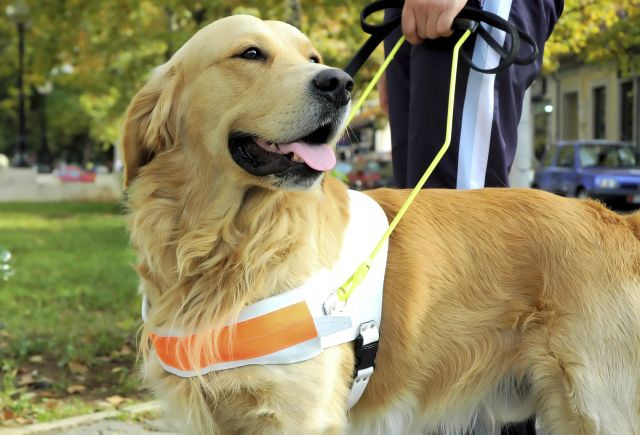Updated on August 12, 2025.
While your family dog may be able to sit, shake and roll over, some canines are specially trained to assist during serious medical emergencies or provide crucial emotional support to those who need it.
Service dogs can notify you of an oncoming blood sugar spike, find an autistic child who’s lost and so much more. Remember that these canines can improve the quality of one’s life, but they can’t replace a doctor’s care.
If you’re a Fido lover, or even if you’re not, we’re confident you’ll find what these dogs do to be pretty remarkable.
Mobility assistance dogs help with daily tasks
For those who have a medical condition preventing them from moving freely, mobility assistance dogs will help a person get to the things they need, when they need it. People who use a wheelchair, or have any balance or strength issues can do more with a canine companion. Mobility assistance dogs can:
- Open doors
- Turn lights on and off
- Seek help from another person in the house
- Assist with pulling a wheelchair
- Pick up dropped items
- Retrieve a telephone
Emergency medical response dogs know when there’s a problem
Often referred to as seizure alert dogs, emergency medical response dogs are prepared to alert their owner when a serious medical event strikes. These dogs are trained to detect epileptic or psychogenic seizures, as well as blood sugar fluctuations in people with diabetes. When these dogs recognize a problem, they’re able to:
- Nudge their owner to initiate action
- Bring medicine or juice
- Find a specific person by name
- Press an alert button that will notify a parent or person of the problem
- Calm owners during the medical emergency
Post-traumatic stress disorder dogs calm nerves
Dogs who are calm, intuitive and hyperaware of their surroundings may be trained to help those with post-traumatic stress disorder, a debilitating mental health disorder that causes depression, anxiety and flashbacks after a traumatic event. These dogs can:
- Circle owners in crowded areas to create personal space for them
- Lower stress and anxiety levels by nudging, pawing and leaning on owners
- Help wake a person from night terrors or nightmares
- Bring medication when asked, or when an alarm goes off
- Lead their owner to an open space outside when experiencing an anxiety or panic attack
- Alert other individuals of a problem or activate an alert system
Guide dogs help the visually impaired
For those who are blind or visually impaired, guide dogs will take directional commands from their blind partner and act on them, keeping them out of harm’s way. Guide dogs normally have a harness with a U-shaped handle that allows the visually impaired person to communicate commands more easily with them. Guide dogs will help those who are blind:
- Avoid obstacles
- Stop at curbs and steps
- Navigate traffic
Facility dogs can lift your spirits
Facility dogs are trained to provide comfort and support to people in nursing homes, assisted living facilities, mental health programs and juvenile detention facilities. Visits from these facility dogs may entail grooming, feeding or fetch playing—activities that can lift a person’s spirits and help with medical rehabilitation and psychiatric therapy. Facility dogs can:
- Motivate people to partake in social activities
- Increase a person’s physical stimuli, helping them to move more freely, even if they have certain health conditions that decrease their mobility
- Offer love and friendship
- Teach responsibility
- Calmly help relieve stress, anxiety, loneliness and negativity
Autism assistance dogs improve your quality of life
Autism is a condition that leads to social hurdles, verbal and nonverbal communication difficulties and repetitive behaviors. The condition can present challenges, for both the child who has it, and their family. Canines may help people with autism in a few different ways. An autism assistance dog can:
- Quickly find children who run, hide or get lost
- Lower a family’s stress levels by providing comfort
- Improve a child’s social skills and encourage social interaction
- Redirect repetitive behaviors by gently nudging
- Provide nighttime comfort that may promote better sleep
- Help expand a child’s vocabulary because children tend to find comfort in talking to dogs
Resources for finding or training a service dog
Think you have a medical condition that might be helped by a service dog? Legally, service dogs are available to anyone with a chronic physical or psychiatric impairment that limits their ability to complete one or more daily activities without assistance.
Most service dogs are Labrador Retrievers and Golden Retrievers, but other breeds such as German Shepherds, Smooth Coated Collies and Vizslas are also commonly trained. Owners and canines can get training through programs like Service Dogs for America, Canine Companions for Independence, Assistance Dogs International and Paws With a Cause. You can also ask your doctor and veterinarian for recommendations, too.
